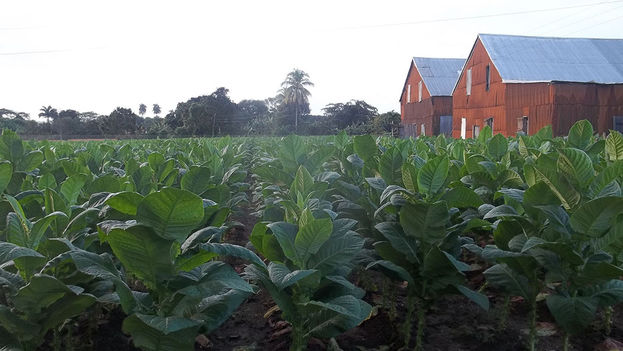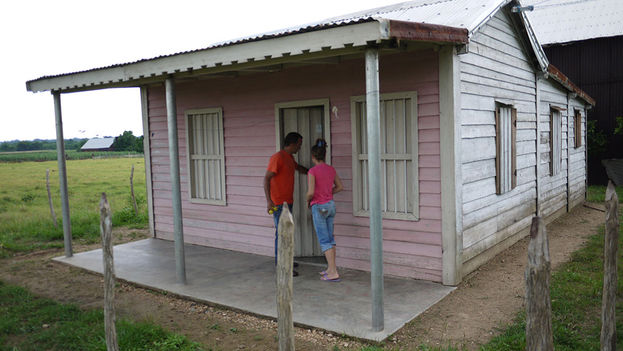
14YMEDIO, Reinaldo Escobar, Havana, 8 August 2014 – In the land of San Juan y Martinez, Bernabé Pérez Gutiérrez planted his first crops and fathered fourteen children. It was during the last years of the 19th century, and the immigrant baptized his farm The Islander, in memory of the Canary Islands where he’d come from. Today, his great-grandchildren are trying to keep one of the most important tobacco plantations in Pinar del Rio running, with the their great grandfather’s same stubbornness and his love for the furrow.
The Islander is a family cooperative inserted into a larger entity called “Rafael Morales Credit and Strengthened Services Cooperative (CCS-F),” consisting of 64 tobacco producers, occupying over 250 acres. It also includes dairy and pig farmers. Only ten of these farmers lease their land (under usufruct), while others jealously hoard their property titles.
What distinguishes The Islander is not only the quality of their tobacco, their fruit or their flowers, nor even the hard work of the members of the Pérez González family. Its hallmark is that this site has been, since the time of Barnabas an example of a sustained endeavor that refuses to be subjugated, neither by the misfortunes of nature nor the whims of the bureaucracy.
During the time of the Canary Islander grandfather, the Islander operated as a consultancy where the farmers came for advice. His son Pragmacio, who became the head of the farm with the death of its founder, converted a part of the house into an area for discussion groups where they analyzed newspaper articles with news of the Second World War and the evolution of the communist regime in Russia.
The layout of the estate is also unique in the area. In 1955, Bernabé’s children built a shrine to their father, who was devoted to the Virgin of Charity. Their religious fervor reached the point where during a drought they organized a procession with the image of the Patroness of Cuba in order to summon the rains. Under the small belltower, the priests of the area have baptized and married many members of the family and their neighbors.
Family denounces the unjust relationship between the producers of snuff and state monopoly that sells
However, the greatest peculiarity of The Islander lies not in its enormous ceiba tree, nor in the small chapel, but in its people. In the current times, where being an entrepreneur and defending the autonomy of the farmers generates suspicion and incomprehension, the Perez Gonzalezes are known in the area for being “grumpy.”
In a country where the established leadership obeys and doesn’t question the powers-that-be, the progeny of that immigrant have had to overcome many obstacles. The family obstinately denounced the unjust relationships between the tobacco producers and the State monopoly that trades in it. Often it’s not about demanding new prerogatives, but demanding that the directors and agricultural officials meet the standards they themselves have set.
Sitting in the doorway, where a sweet breeze blows, some descendants of the obstinate Canary Islander started listing their demands. Bushy eyebrows one and all, they bear the unmistakable family stamp that marks them as stubborn. They relate that among the most insistent of their demands is questioning the calculations of the Tabacuba Company in determining the tobacco growers’ costs for each bushel of leaves. Included in the formula are inputs such as fuel, fertilizer and herbicides, plus adding the wages paid to the workers engaged in planting, cultivating and harvesting and selection of tobacco.
“Every year it’s more expensive, particularly the wages, because nobody wants to work for four pesos,” commented Alfredo Perez, the current head of the family. “However, the company seems to live in another dimension far from reality, and the data they use for what they call the cost sheet.” Times have changed and the costs of living have skyrocketed, but the agricultural bureaucracy continues without updating their old numbers.
With his hat in his hand, Juan Pablo, with a degree in agricultural engineering, complains, “As if it were great news that they now tell us they will pay a little better for every bushel of tobacco, but for every percentage point they raise the schedule, the costs go up six or even ten percent.”
The floor passes from person to person, until it is Nestor Perez’s turn; Nestor dreamed of being a lawyer but they expelled him from the “university for Revolutionaries” for being too confrontational. With regards to the problems of the company, the young man has realized that “when the specialist comes to determine the quality of our offerings, they find a lot of irregularities, and categorize as ‘affected’ a tobacco the produces ample dividends for the company. That’s where the farmer has to stand firm and not accept the impositions. Ultimately we are the ones producing the leaves and we have to learn to set conditions.”

In the middle of the conversation, with the coffee cups now empty, another battle these farmers have waged comes up: the demand for proper electrification of the cooperative. In the late sixties they had provisional access to an alternative electrical line, installed illegally. This is what is commonly called a “clothesline” because it lacks adequate poles and transformers. Since then, and due to the increase in consumer appliances during the last 45 years, the low voltage affects not only domestic energy use, but also production. The Perez Gonzalezes have written letters to all the institutions involved and never stop raising the issue in public assemblies.
Technical problems directly affect performance. “There is a group of producers in the area who average over 15 tons of tobacco every year,” argues Nestor, while putting fruit in a basket. “With stable electricity we could reach 25 tons. We’ve proposed to the State that they open a line of credit for doing this work and we pay for it, but they haven’t accepted this proposal, which makes us think they they are intentionally trying to marginalize us for our way of thinking.”
Alfredo, the youngest of the family—but by no means the least tenacious—says that “although the cooperative is supposedly autonomous, in real life it is subordinate to the Tabacuba Company. For example, we’ve asked for disks for plowing, but when these items arrive, it’s the company that decides how to distribute them according to their own criteria. We can’t buy those any other way because there is no free market offering them.”
The oldest of the all the Canary immigrant great-grandchildren is named Ariel and speaks in direct sentences. While he’s talking, a lean dog with a sharp look sits under the chair where he is sitting. “The cooperatives were left without any batteries for their tractors,” says Ariel. “They have to sell them to us because we order them properly, but these are the things they do to isolate us from the rest of the cooperative. They say we’re a bad example.”
The afternoon advances, but the heat doesn’t let up. A part of the shadow of the great ceiba reaches the doorway. Juan Pablo summarizes the conversation with perfect clarity, “We know that in meetings where we haven’t been invited they warn the cooperative members that they should stay away from us because we are counterrevolutionaries. Someone always comes to tell us about it, because everyone knows that the only thing we want is to work.”
It’s time to go back to the fields, so the five men take up their tools and return to the furrows. Before saying goodbye, they raise one of the biggest pieces of nonsense they have to deal with. “For a farmer to receive a document of ownership for their home, they first have to donate to the State what they built with their own efforts and resources. And so then the State charges you for what you gave it. If you don’t give them the land, you can’t build your house legally.”
